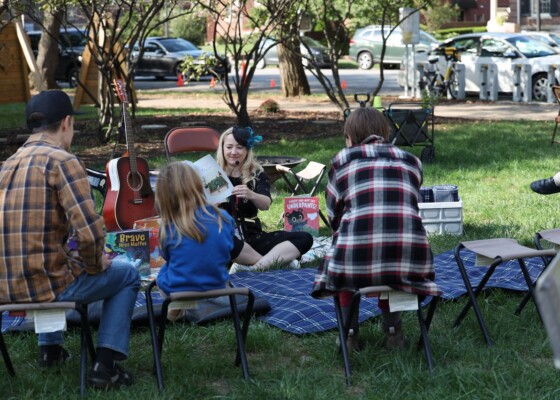Humanities at Home
March 31, 2020Between my work on the suffrage centennial, the upcoming census and daily public health reminders to #StayIN, I’m thinking a lot about civic duty lately. What do we owe to each…
Between my work on the suffrage centennial, the upcoming census and daily public health reminders to #StayIN, I’m thinking a lot about civic duty lately. What do we owe to each other and to our government to ensure our society is healthy and our governance is functional? What can we expect in return? Where do we have personal agency to shape the world around us, and when does it matter that we act collectively to meet a crisis and to protect our most vulnerable? How do our ideas about civic duty expand, if at all, at times like this? I don’t have the answers, yet these are the kinds of questions that we understand better the more points of view we consider. If you need a new topic of discussion with friends and family, why not tackle these big ones?
Stay well and stay in!
—Leah
COVID-19 resources for individuals and groups:
- The Arts & Humanities Institute at IUPUI has started an oral history project to collect the experiences of people during the coronavirus epidemic. They’re looking for both interview subjects and interviewers; learn more here.
- The federal coronavirus relief bill will include funding for humanities, arts and cultural organizations impacted by the crisis. Read the announcement from the National Endowment for the Humanities.
Indiana Humanities happenings:
- Books, Booze & Brains, our monthly book club for science geeks, is going virtual. Tune in online at 6:30 p.m. for a fun talk about cyborgs, artificial intelligence, robotics and graphic novels. Get directions for how to participate via Zoom.
- Tomorrow is Census Day! So many federal resources, including the formula that determines Indiana Humanities’ funding from the National Endowment for the Humanities, are distributed based on census results. You can fill out your census online.
- By the way, it’s the centennial of the 1920 census, which was the first to show that the majority of Americans lived in cities and towns—a major turning point in the urban/rural dynamic and one of the reasons we created the INseparable initiative for 2020.
- April is National Poetry Month! Starting tomorrow we’ll feature Indiana poets and poetry, curated by Indiana Poet Laureate Matthew Graham. And over at Indiana Authors Awards (Facebook, Instagram, Twitter), you can read a poem-a-day by an Indiana poet.
- Has it ever been more important to think and talk about the ways we relate to each other across boundaries? When we’re able to gather again in person, consider hosting a speaker in your community who can help inspire that kind of conversation, as part of our INseparable Speakers Bureau. From beer to water, Brown County to Gary, maps to Middletown, our curated list of talks provide a variety of lenses for thinking about the ways we are, or are not, inseparable. Applications are due today for talks that take place after August 1.
What I’m thinking, reading and talking about:
- To be quite honest, if I have to be shut in, I’m glad it’s just as the conclusion to Hilary Mantel’s brilliant, bloody Thomas Cromwell trilogy arrived; I’ve been reading The Mirror and the Light, the follow up to Wolf Hall and Bring Up the Bodies, which are easily my favorite novels of the last decade.
- For obvious reasons, lately I’ve been thinking of how much of what we consider the Western canon has been directly shaped by the plague and other epidemics. This idea is the focus of “Plague and the Playhouse,” part of one of my all-time favorite podcasts, Shakespeare’s Restless World, which looks at how recurrent plagues, fluxes and other diseases affected the Bard’s life and writing.
What I’m looking forward to:
- I saw the trailer for the upcoming American Experience episode The Vote and I got goosebumps. Mark your calendars for July 6.


